- Home
- Jane Arbor
Lake of Shadows Page 2
Lake of Shadows Read online
Page 2
“I suppose so. Meanwhile”—her sense of outrage drove her to the tartness—“I daresay you’re also planning a row of changing-cabins in the gayer colours, not to mention an ice-cream parlour on the shore?”
He regarded her with an infuriating pretence at awe. “You do make a meal of destructive criticism, don’t you? But no, since most of the guests’ suites are ground-floor they’ll probably choose to change in their own rooms and, believe it or not, I’ve got a chef who counts ices among his specialities, and he wouldn’t take at all kindly to competition—” He paused before adding, “Well, if you’ve seen enough for the moment of what the Professor calls my ‘vandalism’, I’ll bring you now to Bridie who’ll be waiting.”
Kate thought that out on the last devious quarter-mile of their journey, and in sight of the narrow ride which led off the road towards her home she queried: “D’you mean my father doesn’t care for what you’re doing to the Lakestrand?”
Conor Burke’s brows went up. “Well, wouldn’t you know about that—from himself, or from Norah or Bridie?”
“No. Father doesn’t trouble to write personal letters and neither Bridie nor Norah are very good at them.”
“But you’ve seen Norah quite lately?”
“We hadn’t much time, together, and there were other things to discuss.”
“Ah well, you’ll hear the whole of it soon enough.” As he spoke her companion stopped the car, got out and unloaded her bags from the boot.
“Bridie’s orders,” he explained. “That you were only to be brought so far, and any luggage you couldn’t carry to be parked and she’ll come down for it later.”
Kate alighted slowly. “You mean you and Father don’t—meet?”
“Only, you might say, at sword-blade length. But by his will, not mine.”
“Then, though I’m very grateful to you, Bridie had no business to—”
Again she found his grin disarming. “Well, she had to get you home somehow, hadn’t she?” He backed, turned and was ready to move off. “You’ll do now?” he asked.
“Yes, and thank you—”
“Ah, don’t give it a thought. Whenever Bridie has to look for a packhorse, she knows where to turn. Don’t forget to tell her about the car and that if she still can’t move it I’ll arrange for a tow, will you?”
He shot away without a backward look. Kate looked after him and waited until he was out of hearing. Then, her lips set, she took up a suitcase in either hand and set off doggedly along the ride.
As always, coming upon the house from the ride was a surprise experience. Now one was among trees without a glimpse of it; now there it stood, without benefit of entrance gate or surround, at the full curve of its halfmoon of gravel frontage, its stonework shabby, its deep sash windows a blind stare towards the lake they could not see, though a short path ran directly down to the small landing-stage from which the girls swam. The front door needed a coat of paint and so did the window frames. I daresay I shall have time and to spare to see to that, thought Kate as she tried the door and then waited for Bridie to answer her knock.
Bridie’s welcome was staccato and overwhelming. Clad in faded jeans and a duffel-coat, she was carrying an empty corn pan in one hand, a pail containing a layer of eggs in the other, and set down both in order to hug Kate.
“Darling, darling Kate! I reckoned I’d have time to feed the hens before you arrived. That’s why I wasn’t down the ride to meet you or on the lookout for you. And you lugged your bags alone! Oh, you shouldn’t have—even though it will save our having to sneak down later to fetch them. Have you had lunch? Oh, early, before you caught your plane? Tea, then? Do you want to go to your room, or will you help me to get tea and we’ll have it in the kitchen? At lunch Father was wearing his Do Not Disturb face, so if you could wait to see him until supper, I think it would be best.”
So, needing a few crisp words with Bridie first, did Kate. But she elected to go to her room, turning at the foot of the stairs to ask, “I suppose I’m in my old one, next to Norah’s?”
“No, in Father’s. It’s larger than yours, and Norah thought you’d prefer it. You see, Father—well, he sleeps downstairs now. Dr. Kilian said he ought to.”
“You mean his heart is worse? But you hadn’t told me, and when I asked Norah how he was, she didn’t either!”
“She had said not to worry you. Time enough when you had the care of him. And you know what he is himself—he’d as soon deny he had a heart, let alone a dicky one, rather than let it interfere with his finishing a treatise on the sixth century, or whichever other one has his attention at the moment.”
Kate did not reply to the edge of bitterness in Bridie’s tone. But that was their father all over, she acknowledged. Professor Charles Ruthven lived passionately and vividly in the past, his writings re-creating it only for students of Irish folklore as dedicated as himself, and he allowed the present to touch him only when it offended him or when he could not shut it out.
It had not always been so. Younger, he had been gay, tolerant, a good companion, and he had ardently loved the girls’ mother, whom he had married while he held a professorship at an English university. But her death at Bridie’s birth had begun the long process of his turning into a recluse, to the point where his daughters could ruefully joke among themselves that Father had more concern for the Children of Lir than for them, and that he would as soon find himself in Tara’s Halls as in his own home, let alone a neighbour’s.
After his wife died his widowed sister Mary had cared for him and the children until, when she decided to emigrate to Canada, Norah had been old enough to take over. At the time Professor Ruthven appeared to have scarcely noticed his change of housekeeper. Just as, Kate believed, he had said goodbye to Norah, on her leaving to be married, in the comfortable assurance that he could look to his second daughter’s sense of duty to take Norah’s place.
But detached as he was, he was Father, lovable in his fashion and deserving of all their loyalty. Which was why, when Kate went down to the kitchen, she took up Bridie at once on the subject of her enlistment of Conor Burke’s help in face of Charles Ruthven’s exception to the man.
Kate said, “Over the phone you called Mr. Burke a ‘bastion’; does that mean you depend on him quite a lot and often?”
“And what if I do?”
“Just that you shouldn’t, if Father and he don’t get on.”
“Oh, that—! That’s simply Father’s thing about the improvements Conor is making over at the Lakestrand—”
Kate lifted an eyebrow. “Improvements?”
“Changes, then, and if Father had his way, nothing about the Lake should change from here to eternity. But Conor has bought the Lakestrand, and hasn’t he the right to do what he likes with his own property? Besides, in himself he’s nice. Well, didn’t you like him?” Bridie challenged.
Kate hesitated, then chose a word straight from Irish idiom. “I thought he was rather bold,” she said.
“Bold? He is not!”
“Too sure of himself, then.”
“Well, where’s the wonder in that? He’s not much over thirty, and I should think the sky is the limit for the Lakestrand by the time he has done all he plans for it.”
“And when he has, the Lake will probably have a cross between a funfair and a lido on its hands. In fact,” added Kate, warming to the argument, “I shouldn’t wonder if he hasn’t got a fleet of pedalos and speedboats at the ready. And what is Father going to say to that?”
“You mean you’d hate it, which makes you as stuffy and old-hat as Father!”
“It’s simply that I love the Lake too much to want to see it spoilt.”
“And who is spoiling it? Not Conor, just because he has cut down a few trees. Anyway, there are still acres of it left, and even here the Lakestrand is out of sight and earshot. Besides, it’s partly because the lake is beautiful that Conor doesn’t see why more people shouldn’t discover it and enjoy it too.”
“ ‘See Loch
na Scathan by courtesy of, and to the ultimate profit of, Mr. Conor Burke,’ ” murmured Kate.
“And that’s where you’re wrong too,” Bridie retorted. “Because he plans to make the Lakestrand ‘luxury’ during the winter season, just so that he can put his prices down in the summer to the young people he wants to attract.”
“A veritable Robin Hood, in fact!”
Bridie considered that for a long moment. Then, “My word, he did rub you up the wrong way,” she said, adding, “Anyway, did he say he could do anything about the car for me?”
Kate gave her Conor Burke’s message. “But we can’t accept,” she told her. “If it still refuses to start tomorrow, we must get someone out to it from the garage in Morah Beg. Because you really can’t go on accepting help or asking favours from the Lakestrand while Father apparently feels as he does about it. Anyway, I’m surprised you’d consider giving Pat Phelan a free hand with a spanner on the car.”
“Oh, phooey! Of course it would be Conor himself who would work on it. Among other things, he’s a wizard with cars. And how can I drop him, just like that? He’s my friend,” Bridie protested stormily.
“But according to him, he and Father are completely at odds.”
“Does that matter, when Father is so much out of this world that he doesn’t know whether I go to Conor for help or not?”
“All the more reason why you shouldn’t trade on his being ‘out of this world’. It’s not fair, don’t you see? For instance, I suppose the idea behind my being dropped at the end of the ride was that he shouldn’t have to know how I got here from the airport?”
“Well, there 'wasn’t any point in upsetting him. That’s why I telephoned you from the Lakestrand instead of from here, and I thought that if Father asked you, you could sort of give him the impression you came by hired car.”
“I think,” said Kate, “you’d better hope he doesn’t ask me. Which, being Father, he may not. On the other hand, he may know more about your association with Conor Burke than you think.”
Bridie scowled, “Association! Anybody’d think Conor and I were running a gambling-hell or something! Do you seriously expect me to snub him next time we meet and not to go over to the Lakestrand any more?”
“Of course not. I’m only asking you not to put us under obligations to him until he and Father come to terms, and not to pretend to Father, even by omission, that you haven’t seen him when you have.” Kate paused, then added diffidently, “Anyway, if as you say he is over thirty, isn’t he—well, a bit old for you?”
At that Bridie stared, then threw back her head and gurgled with laughter. “Old? Oh, Kate, you—you matchmaker! Why, there’s not a thought of that in me over Conor. Nor in him over me. It’s simply that he has just the cut of the brother I’d have chosen for the three of us, if we’d had one. And his mother is quite a lamb too.”
Oddly relieved, Kate laughed too. “Sorry, pet! And for calling him bold, if you like him so much.” She rose and began to stack their tea-things. “Look, let’s wash these up and then I’ll go and announce myself to Father, shall I?”
While she washed up, Bridie set about preparing supper and they talked as they worked—about London, about Kate’s journey, about Norah. Until into a silence Bridie dropped a question of her own.
“This Basil Kent you’ve mentioned in your letters, Kate—were you seeing him much?”
“Quite a lot, yes.”
“How did you come to meet him?”
“At a cocktail party which my boss, Mr. Prentiss, gave for the publication of Basil’s father’s autobiography. I’d helped Mr. Kent with some research for it, but I hadn’t met Basil until then.”
Bridie nodded. “And you’re in love with him a bit?”
Kate drew a long breath. “Yes.”
“And he with you?”
“I think so. Yes, I’m sure so.”
“Then how did he take your having to leave London? Are you engaged to him? Or going to be?”
“No ... that is, we haven’t discussed it. But he has business in Cork soon and we shall see each other again then, of course.”
“Is he coming here?”
“He wants to, yes.”
“Oh. I’m glad. Because if you’re in love with him he must be nice.” Bridie broke off. Then, studiedly casual, she added, “By the way, Kate, I don’t know if Norah told you, though she said she probably wouldn’t—but Dennis Regan is back again. On the Island—you know—”
CHAPTER TWO
Kate’s hands stilled over their task. “Dennis—on the Island? But there’s no one there! I—thought about him and looked from the shore, and there was no smoke from the house and no dinghy at the stage,” she said blankly.
Bridie said, “Well, maybe he’s off somewhere for the day. But he is back, and he has his forge going too. You knew he was injured himself—his hip was broken and he’ll always walk with a limp—in the accident that killed his wife?”
Kate nodded. “Yes, Norah wrote so at the time, and I wrote condolences to him. But the reply came from his mother-in-law, Lady Soames, who said she was answering for him as he was too ill to do so himself. After that I heard nothing more, and I don’t suppose you did, as he wasn’t here and wasn’t coming back?”
“No. He married Aileen Soames from her home in Belfast and they were going to live there in a house her father gave them. But she was killed only a week or two after their honeymoon. Dennis was driving the car and it ran into a stationary lorry. It wasn’t properly lighted and he was exonerated, but did that help him, poor fellow?”
“I know,” Kate agreed. “I can imagine he wished over and over that he had been the one to die, not Aileen. But why has he come back to the Island? He hasn’t any people of his own down here, and at least in Belfast there are hers.”
“I don’t know, and he doesn’t need to work. It seems that, as well as being the daughter of Sir Magnus Soames, Aileen was an heiress in her own right from her grandfather, and she left Dennis everything.”
“How long has he been back?”
“Two months or three.”
“As long as that, yet neither you nor Norah told me when you wrote?”
Bridie hesitated. “Well, as you had already written a bit about your Basil in your own letters, Norah said that if you had begun to get over whatever came between you and Dennis, there was no point in reminding you of him by telling you he was here again. So we didn’t.”
Kate protested, “But nothing ever had ‘come between’ Dennis and me, except that I wanted to go to England and meant to, as soon as I got the chance. It was simply that we were much of an age; we went about together and he kissed me once or twice. But I wasn’t in love with him, and surely the proof that he wasn’t with me was how soon he married after I had gone?”
“Well, it certainly was whirlwind enough to be a love-match,” Bridie allowed. “Aileen Soames came to stay with these friends of his in Morah Beg; before you could turn round they were engaged and he had shut up his house and the forge and was away with her to the North, and you know the rest. Anyway, I’m glad you aren’t going to mind seeing him again, though when you will I don’t know. Norah asked him to supper once, but he made an excuse not to come. And I don’t think he troubles anyone else very much, except that he keeps his car at the Lakestrand and rows over there sometimes in the evenings for a drink.”
Bridie completed her laying of a trolley with silver and glass and table linen and now pushed it towards Kate. “Be a pet and do the dining-room table before you go to Father,” she urged. “Open up the stove too, because it’ll be cold in there. Oh, and—” As she spoke she added a taper and matches to the trolley and met the question in Kate’s glance with a nod.
“Yes, still candles,” she confirmed. “As Norah always said, be thankful Father doesn’t expect his food to be cooked over a brazier or a turf fire. But he still insists we all eat by candlelight—or else!”
In the dining-room Kate riddled the anthracite stove, drew the cu
rtains and laid the table, her thoughts threading memories of Dennis Regan as she worked.
Dennis—who at twenty-one had already shed whatever background he had had, to appear on the Lake and to merge with its life as if he had been born there. Dennis who—or so Kate’s impression went—had not been there on one day, yet on almost the next had made a bachelor home from the shell of the house on the lake-island and with his own hands had built alongside a forge for the wrought-iron work which was his craft.
Dennis—with whom she had swum and played and scrambled over the mountains, telling him her dreams, listening to his. They had simply been Dennis and Kate, boy and girl friends, kissing as rarely and as briefly as they quarrelled, discovering the sweetness of embrace, though without discovering love in the process.
And since then Dennis—poor Dennis—had had his Aileen and she still had Basil... Yes, it would be good to see Dennis again, to talk, to fill in gaps, to pick up the pattern of their friendship.
At that point she had finished the table except for putting the four sturdy Connemara marble candlesticks in place, and on sudden impulse she decided against them in favour of the slender, branched wrought-iron pair, Dennis’s gift and an early product of his island forge, which stood on a Queen Anne desk in the window.
She found a box of candles in a sideboard drawer, ensconced all eight of them and was putting the taper to each as Bridie came in with a tray of cold dessert.
Bridie said obviously, “Oh, you’re using Dennis’s instead of—”
“Yes, why not?” said Kate, and went to switch off the electric light, leaving table, room and themselves to the fitful flare and dimming of the candles’ glow.
As she had foretold to Basil, Professor Ruthven’s gentle preoccupation accepted her arrival as a very fair exchange for Norah’s departure. Bridie was a mere child, but one responsible daughter on the strength and all was well with his household, his manner implied, and Kate saw both the humour and the futility of expecting him to realise the extent of her sacrifice in coming back.

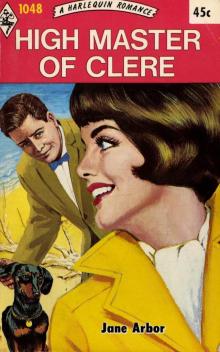 High Master of Clere
High Master of Clere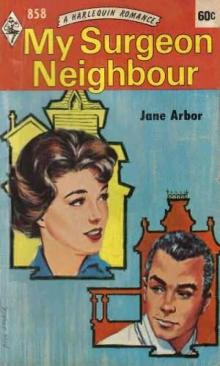 My Surgeon Neighbour
My Surgeon Neighbour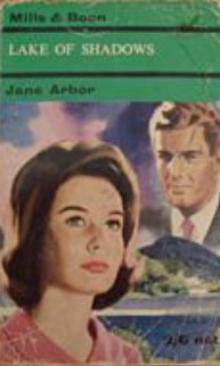 Lake of Shadows
Lake of Shadows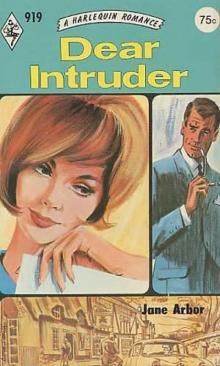 Dear Intruder
Dear Intruder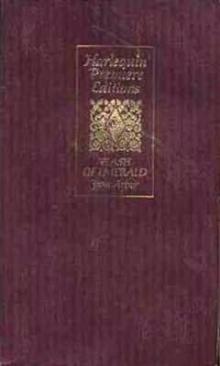 Flash of Emerald
Flash of Emerald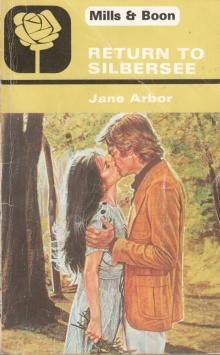 Return to Silbersee
Return to Silbersee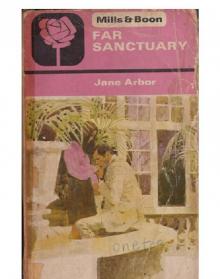 Far Sanctuary
Far Sanctuary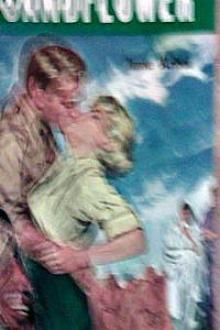 Sandflower
Sandflower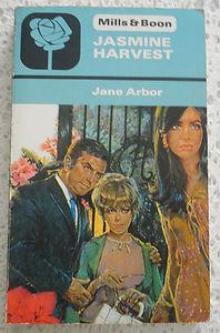 Jasmine Harvest
Jasmine Harvest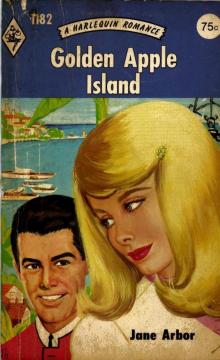 Golden Apple Island
Golden Apple Island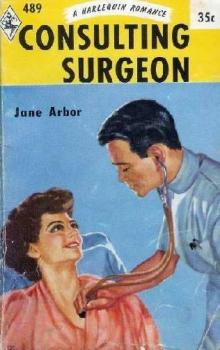 Consulting Surgeon
Consulting Surgeon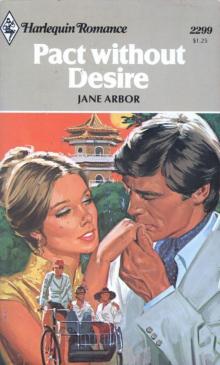 Pact without desire
Pact without desire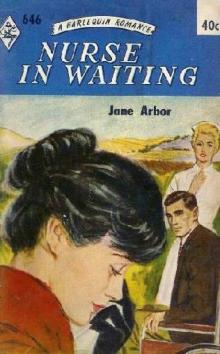 Nurse in Waiting
Nurse in Waiting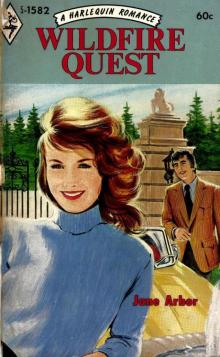 Wildfire Quest
Wildfire Quest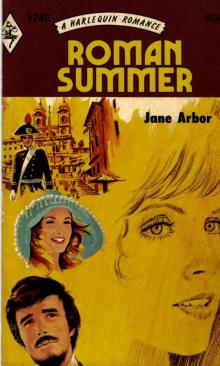 Roman Summer
Roman Summer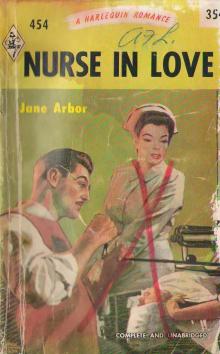 Nurse in Love
Nurse in Love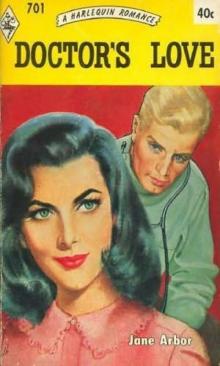 Doctor's Love
Doctor's Love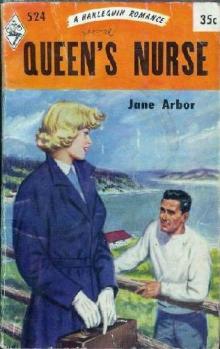 Queen's Nurse
Queen's Nurse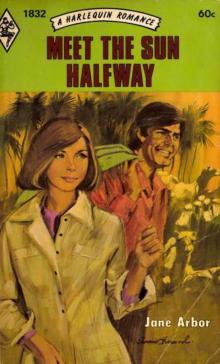 Meet the Sun Halfway
Meet the Sun Halfway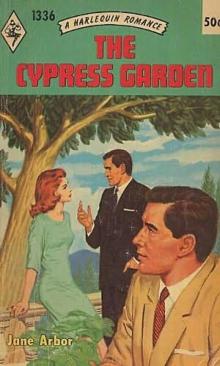 The Cypress Garden
The Cypress Garden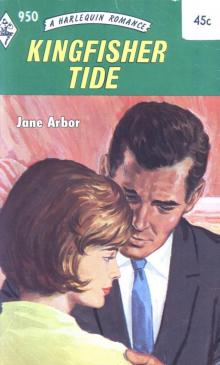 Kingfisher Tide
Kingfisher Tide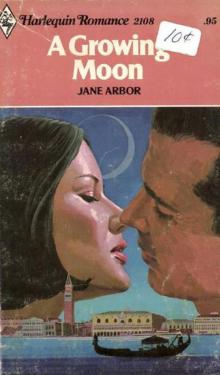 A Growing Moon
A Growing Moon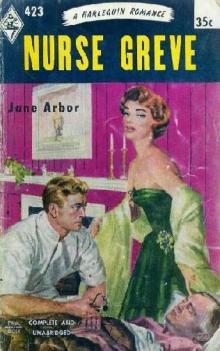 Nurse Greve
Nurse Greve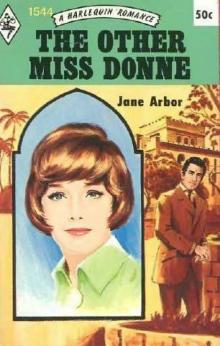 The Other Miss Donne
The Other Miss Donne